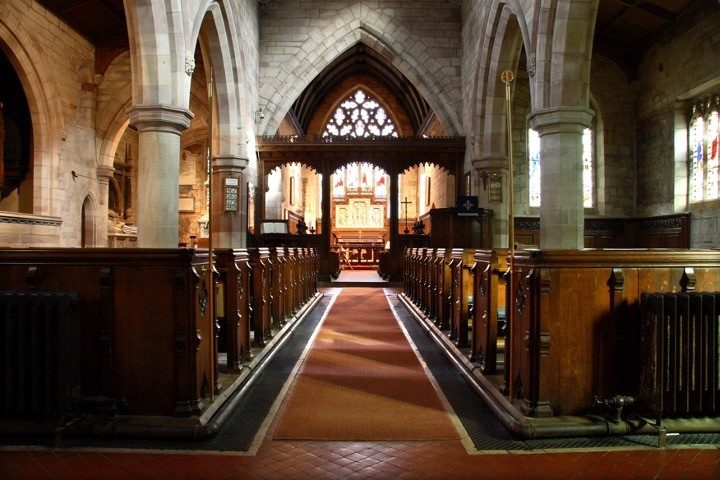
The latest survey from the nonpartisan Public Religion Research Institute (PRRI) provides more proof, if more proof be needed, that the Marxist march to change the culture through America’s churches continues.
The survey reveals that mainline clergy from the “seven sisters”: the United Methodist Church (UM), the Evangelical Lutheran Church in America (ELCA), the Presbyterian Church (USA) (PCUSA), the American Baptist Churches USA (ABCUSA), the Episcopal Church, the United Church of Christ (UCC), and the Christian Church (Disciples of Christ) (DOC) — are far more liberal than their congregations. And they have been getting more liberal since the last time PRRI conducted its survey, 15 years ago.
PRRI interviewed, either in person or through online surveys, more than 3,000 of those clergy, which revealed the extent to which Marxism is now being promoted cloaked in Christian rhetoric. In its summary, PRRI concluded that “mainline Protestant clergy … are less politically aligned with their congregants … [which explains why those denominations] have suffered significant declines in membership.”
Author W. Cleon Skousen, a former FBI special agent, wrote his monumental The Naked Communist in 1958, and it remains a bestseller today, with numerous reprintings and over a million in sales. In it he outlined the Marxist goals for the transformation of the American Republic into a communist dictatorship. It is not for the faint of heart or for those just coming into the light of the country’s present reality.
Goal No. 27 of the Marxist march calls on “communist warriors to infiltrate churches and replace revealed religion with ‘social’ religion.” As John Eidson explains in his recent review of Skousen’s book and the communists’ goals,
Revealed religion is based on Scripture; the communist concept of social religion teaches citizens to look to government, rather than God, for their salvation.
Scriptural religion is about individual salvation; social religion is about collective salvation, a concept that does not exist in Christianity.
In many churches on the religious left, the communist goal of replacing revealed religion with social religion has largely been accomplished, as evidenced by the constant refrain of religious-left pastors who sermonize about their undying commitment to the cause of “social justice.” The term refers to justice within a society that allocates wealth according to the Marxist directive “From each according to his ability, to each according to his needs.”
From the PRRI survey:
Overall, mainline clergy are much more likely to identify as Democrat than as Republican. About half identify with the Democratic Party (49%), compared to only 14% who identify with the Republican Party….
The UCC has the highest share of clergy who identify as Democrat (71%), followed by PCUSA (61%), Episcopalian (60%), DOC (60%), and ELCA clergy (59%).…
Strong majorities of clergy in most denominations self-identify as liberal: UCC (84%), PCUSA (70%), Episcopal (69%), ELCA (68%), and DOC (62%).
The gap between the liberals and Marxists in the pulpits and their congregations is enormous: “While mainline Protestant churchgoers in the general population tend to identify more as Republican … [this compares] to [just] one in four who identify as Democrat.”
This gap first turned up in 2008, and has widened since then:
Compared with our 2008 analysis, we find that mainline Protestant clergy have become both more likely to identify as Democratic and less likely to identify as Republican; mainline clergy are also more ideologically liberal and/or more moderate than in our 2008 survey, with fewer clergy identifying as conservative.
As Skousen and Eidson noted, pulpit Marxists are promoting the Marxist line. Ninety percent of them support LGBTQ “rights,” and they oppose business owners who refuse to do business with them if doing so violates their religious beliefs.
Nearly eight in ten favor allowing same-sex couples to marry; three-fourths of them opposed the recent Supreme Court decision in Dobbs that overturned Roe v. Wade; and fewer than one in eight agree with the statement, “God intended America to be a new promised land where European Christians could create a society that could be an example to the rest of the world.”
In contrast, four in ten attending those mainline churches agree with that statement, and many of them can quote its source in Matthew 5:14.
On the topic of politics, Marxists in the pulpits are largely silent, according to PRRI. Fewer than one in ten discusses election fraud or abortion. But when it comes to Marxist topics such as poverty, racial inequality, racism, and “social justice,” 90 percent of them freely push the Marxist agenda.
“Social justice” is the theme most often pushed by the clergy in these denominations, with seven in ten bringing the issue into sermons on Sunday regularly.
If there is any good news here, it is in the astounding drop in attendance in these “seven sisters” and the astonishing increase in those attending and worshiping in “nondenominational” churches. As Christianity Today recently reported, in the mid-1970s nearly a third of Americans were affiliated with one of the “seven sisters.” Today, that number has dwindled to less than one in ten.
Many millions (6.5 million in 2020 alone) are finding their new church home among nondenominational churches, and currently thirty percent of those attending church regularly go to a nondenominational church. As Daniel Silliman noted:
There are now five times more nondenominational churches than there are Presbyterian Church (USA) (PCUSA) congregations. There are six times more nondenominational churches than there are Episcopal. And there are 3.4 million more people in nondenominational churches than there are in Southern Baptist ones.



